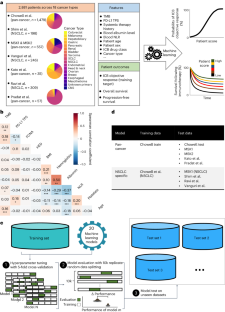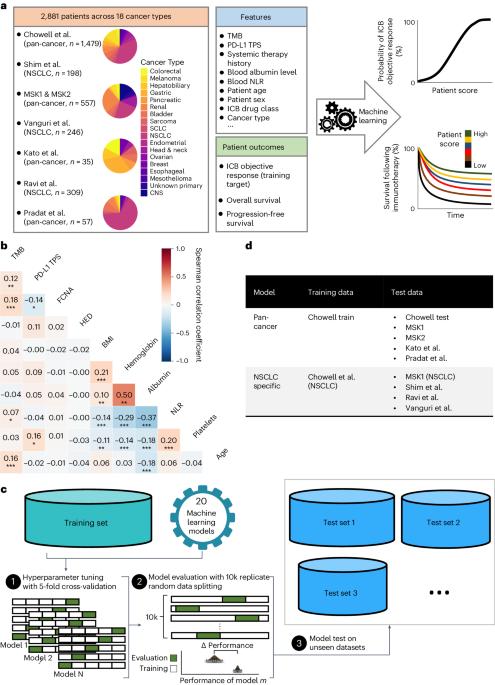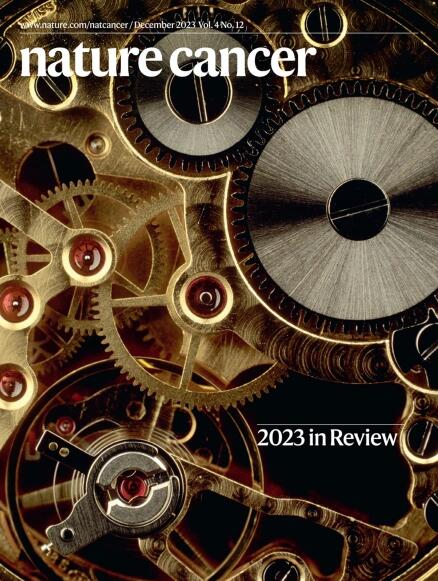LORIS 利用常见的临床、病理和基因组特征,对患者接受免疫检查点阻断疗法后的疗效进行了可靠的预测。
IF 23.5
1区 医学
Q1 ONCOLOGY
引用次数: 0
摘要
尽管免疫检查点阻断疗法(ICB)在癌症治疗中产生了革命性的影响,但准确预测患者的反应仍然具有挑战性。在这里,我们分析了一个大型数据集,其中包括2,881名接受过ICB治疗的患者和841名未接受过ICB治疗的患者,涉及18种实体瘤类型,涵盖了广泛的临床、病理和基因组特征。我们利用六特征逻辑回归模型开发了一种名为 LORIS(基于逻辑回归的免疫治疗反应评分)的临床评分。即使肿瘤突变负荷或程序性细胞死亡 1 配体 1 表达较低,LORIS 在预测 ICB 反应和识别有反应的患者方面也优于之前的特征。在大多数癌症类型中,LORIS都能预测患者的客观反应以及短期和长期生存期。此外,LORIS 与 ICB 反应概率和患者生存期之间呈现出近乎单调的关系,可对患者进行精确分层。LORIS 是一种准确、可解释的方法,只需使用几个易于测量的特征,它有助于改善精准医疗的临床决策,使患者获益最大化。LORIS 可作为在线工具在 https://loris.ccr.cancer.gov/ 上获取。本文章由计算机程序翻译,如有差异,请以英文原文为准。


LORIS robustly predicts patient outcomes with immune checkpoint blockade therapy using common clinical, pathologic and genomic features
Despite the revolutionary impact of immune checkpoint blockade (ICB) in cancer treatment, accurately predicting patient responses remains challenging. Here, we analyzed a large dataset of 2,881 ICB-treated and 841 non-ICB-treated patients across 18 solid tumor types, encompassing a wide range of clinical, pathologic and genomic features. We developed a clinical score called LORIS (logistic regression-based immunotherapy-response score) using a six-feature logistic regression model. LORIS outperforms previous signatures in predicting ICB response and identifying responsive patients even with low tumor mutational burden or programmed cell death 1 ligand 1 expression. LORIS consistently predicts patient objective response and short-term and long-term survival across most cancer types. Moreover, LORIS showcases a near-monotonic relationship with ICB response probability and patient survival, enabling precise patient stratification. As an accurate, interpretable method using a few readily measurable features, LORIS may help improve clinical decision-making in precision medicine to maximize patient benefit. LORIS is available as an online tool at https://loris.ccr.cancer.gov/ . Chang et al. performed a pan-cancer multimodal data integration analysis and devised a model, LORIS, that can predict objective responses to immunotherapy and patient survival across many cancer types and allow for patient stratification.
求助全文
通过发布文献求助,成功后即可免费获取论文全文。
去求助
来源期刊

Nature cancer
Medicine-Oncology
CiteScore
31.10
自引率
1.80%
发文量
129
期刊介绍:
Cancer is a devastating disease responsible for millions of deaths worldwide. However, many of these deaths could be prevented with improved prevention and treatment strategies. To achieve this, it is crucial to focus on accurate diagnosis, effective treatment methods, and understanding the socioeconomic factors that influence cancer rates.
Nature Cancer aims to serve as a unique platform for sharing the latest advancements in cancer research across various scientific fields, encompassing life sciences, physical sciences, applied sciences, and social sciences. The journal is particularly interested in fundamental research that enhances our understanding of tumor development and progression, as well as research that translates this knowledge into clinical applications through innovative diagnostic and therapeutic approaches. Additionally, Nature Cancer welcomes clinical studies that inform cancer diagnosis, treatment, and prevention, along with contributions exploring the societal impact of cancer on a global scale.
In addition to publishing original research, Nature Cancer will feature Comments, Reviews, News & Views, Features, and Correspondence that hold significant value for the diverse field of cancer research.
 求助内容:
求助内容: 应助结果提醒方式:
应助结果提醒方式:


